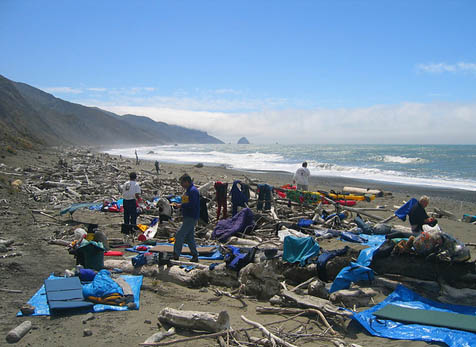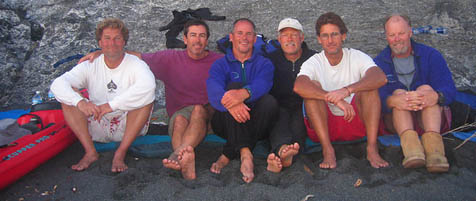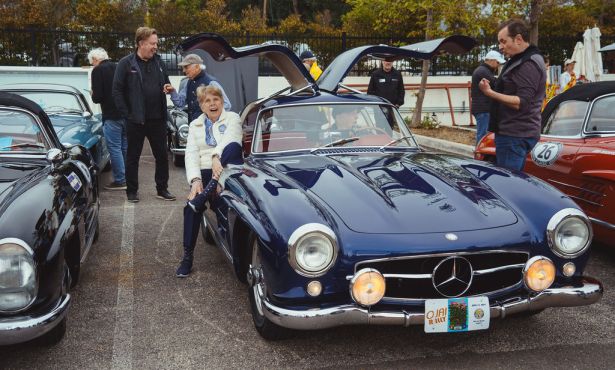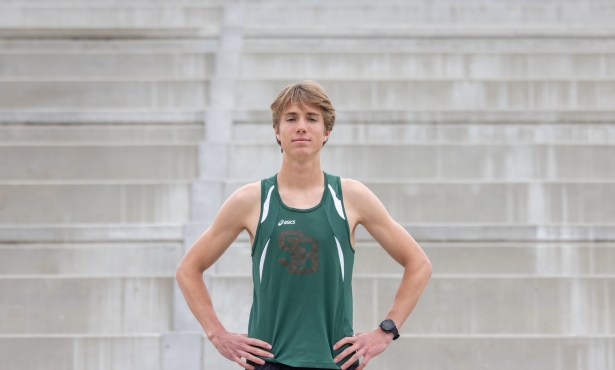Kayaking the California Coast
Back with the Paddle Again

The three kayakers stepped out of their brightly colored Scupper Pro kayaks and onto A±o Nuevo Island, part of a natural preserve 55 miles south of San Francisco. The only structure on the island was an abandoned house that once served as shelter for the lighthouse caretaker and is now home to various seals that group around the fireplace like a family in winter. The three men-Santa Barbarans Dave Powdrell, John Beardsmore, and Mark Levy-started up the beach toward the dilapidated house, causing a wave of seals basking in the sun to lurch to life and lumber down toward the sea. As the large animals plunged by the dozens into the cold northern California waters, it suddenly hit the men-they had just put the food source in the water in one of the most infamously Great White Shark-infested areas on the California coast.
After the three watermen investigated the small island, they had no choice but to get back in their boats. “It was eerie,” Powdrell said. “We kept the kayaks close [together] to look like a larger ship : something that sharks wouldn’t want to chomp on.” As they paddled back in silence, Beardsmore peered into the murky water, wondering just how exposed to the hunters they were.

On August 26, Powdrell, Beardsmore, Levy, Phil Morreale, Rob Mohle, Derek Levy, and Doug Powdrell finished their paddle of the California coast with the final stretch between Humboldt Bay and the Oregon border. Although this year’s trip is just one of the many-dating back to 1994 when a group of determined men started making this 57-day, 1,094-mile paddle up the coast of California-it was particularly special because fate had put these treks on hold for the past two years.
On the morning of November 29, 2004, Dave Powdrell, an accountant and considered the mastermind behind the adventures, suffered a stroke that rendered the right side of his body paralyzed. As he remembered, he “couldn’t move a finger, couldn’t move a toe,” and had trouble with basic addition. “I didn’t know what two plus two was, which for a CPA is kind of scary,” he said. “It was like asking what’s orange plus yellow; it just didn’t make any sense to me at all.” After a series of tests, it was determined that Powdrell had been born with a “fistula arterial ventricular malformation,” a ticking time bomb in the healthiest of people. He was later operated on at UCLA in a brain surgery that took eight hours and left him with 52 stitches.
Two days after his initial stroke, Powdrell became an inpatient at the Rehabilitation Institute at Santa Barbara (RISB), a subject that can easily bring him to tears. During his stay at RISB, he worked with a speech therapist, a physical therapist, and an occupational therapist. Within a month, he was walking, running, and adding numbers with ease, a feat Powdrell credits to the institute: “I attribute it all to those guys; they motivate you, they work you hard.”
According to Powdrell, “Not everyone gets to RISB, but when you make it there, you have this great opportunity to get better in some form or fashion.” In fact, RISB has returned 94 percent of its 653 in-house patients-people suffering from brain trauma and stroke, among other serious ailments-to the community. Now Powdrell volunteers on Fridays and Saturdays at RISB, serving food, listening to patients, and occasionally sharing his own success story.
Return to the Water
“[This year was] pretty special,” Beardsmore admitted, “because it was iffy if Dave would be able to complete the trip. : I wouldn’t have finished if Dave couldn’t go this year.” In fact, the trek is not something many people in the professional kayaking community have accomplished, and Powdrell and his crew are decidedly not professionals. The original intent of the trips was to paddle into surf spots with difficult access as a veritable backpacking trip on water. Even their gear gives them away.
“These trips are made on sit-on-top plastic kayaks,” Mark Levy said. “Purists in the kayaking community look at us and think we’re total geeks.” Geeks or not, there is a method to their madness. This group has made a very particular decision in kayak choice: the more durable, the better, since they will be dragged over rocks, washed onto beaches, and generally beaten up by the end of the trip.
There are a remarkable amount of stories that begin with “we really shouldn’t have done that,” but either through an impressive sense of humor or an amazing amount of luck, no one has ever come out with serious injuries. One of the tales includes crossing the San Francisco Bay at 7 a.m. in dense fog through busy shipping lanes, as foghorns sounded in the shapeless white surroundings. “That was a dicey thing to do,” Powdrell admitted. On another trip, the men left Humboldt Bay, only to find a harsh south wind blowing hard into their faces. Experiencing rough conditions and unable to continue, they elected to return to the safety of the harbor but were sidetracked when a rogue wave washed Mark Levy onto a driftwood-covered beach, which instantly became their camping spot.
What makes the trips well worth it doesn’t seem to be the paddling itself, but the chance these guys have to hang out together on some of the world’s most beautiful beaches and coastline. In fact, the paddling can become sheer drudgery, at times battling high wind and surf. According to Beardsmore, the good part really starts in the afternoon. “We’re out of the water by two o’clock,” which is when the fun-and bocci ball-begins. Each trip is marked by a competitive winner-takes-all poker game to which each participant must bring an item of “high value,” or, as Powdrell described them, “T-shirts, ear phones, and the occasional bottle of alcohol.”
Powdrell’s paddling friends are so thankful for his recovery that this year’s trip was used as a fundraiser for RISB. In the style of a jog-a-thon, the participants accepted pledges and donations based on their completion of the trip. To date, they have raised $16,190 for the institute.
If you would like to make a donation to the 2007 Paddle for Dreams kayak fundraiser, contact RISB at 569-8999; 100 percent of your donation will be used for RISB’s Therapeutic Recreation Extension Classes and Aquatic Wellness and Exercise Programs.



